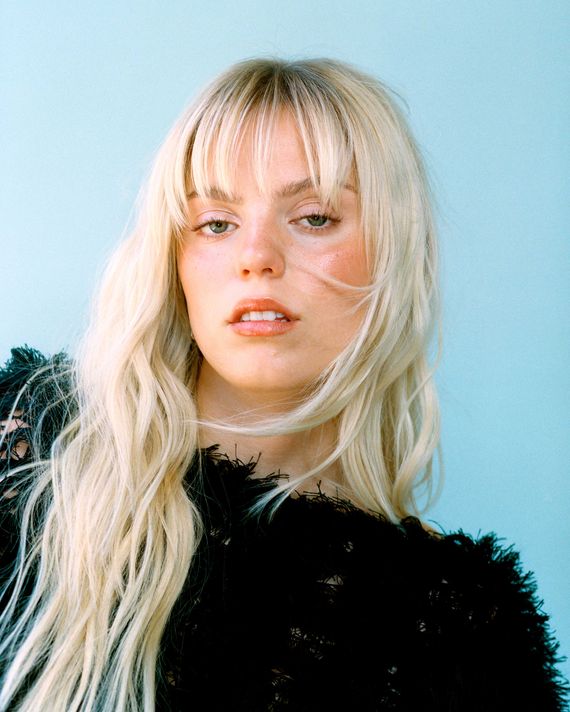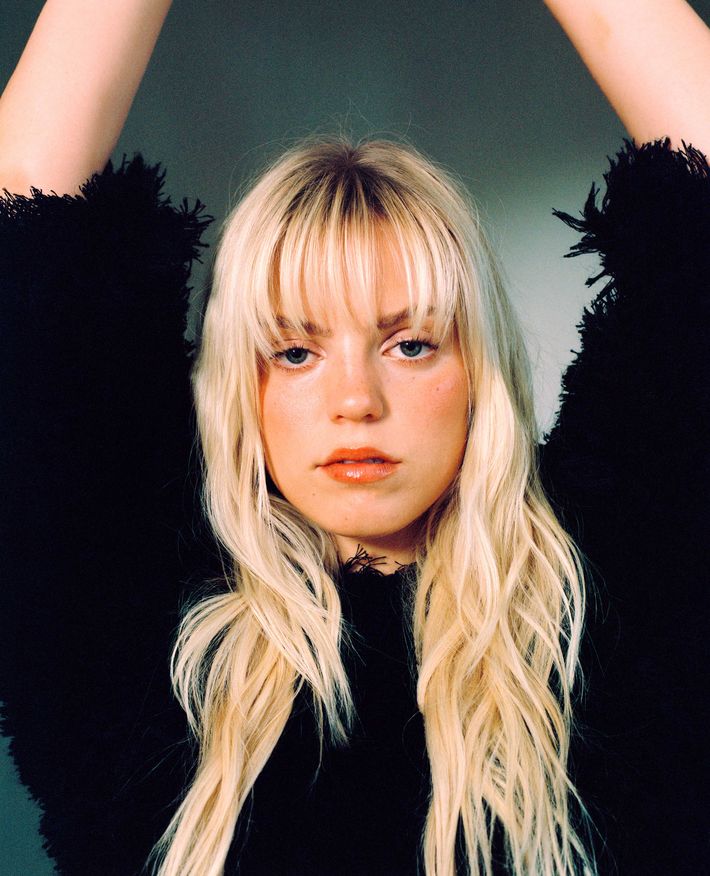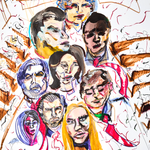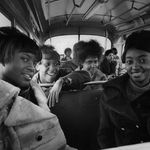
It’s a hazy early-June day in Santa Monica, and Reneé Rapp is drinking a muddy purple smoothie — the strawberry probiotic from the notoriously healthful, exorbitantly priced grocer Erewhon. The 23-year-old actress and singer moved from New York to Los Angeles in 2021 to film the Max series she is now preparing to exit early. This is where her “white woman shines,” she says. “Not the real, amazing, beautiful, culturally dense Los Angeles. I mean Erewhon. I work solely so I can go to Erewhon.”
This is the blasé take-it-or-leave-it attitude that has become Rapp’s signature in her two short years in Hollywood. Her permanently skeptical eyebrows are often deployed to withering heights as a performer, attracting praise and pockets of fandom in every medium she has tried. Someone who can barely deign to be there? That’s glossy apex predator Regina George of Broadway’s Mean Girls, whom Rapp played as disdainful, bored, bossy, and drowning in her own confidence. That’s absolutely Leighton Murray, the deliciously caustic, closeted fan-favorite rich girl in Mindy Kaling and Justin Noble’s The Sex Lives of College Girls (Rapp’s first TV role). That’s the no-filter pop singer on the verge of releasing her first album. And that’s Rapp on TikTok, where she posts things like a video with a redacted list of the “grudges I hold and why” to her 1.4 million followers.
We’re on a discreet hotel patio yards from the beach. Rapp is wearing thick black liner around her chlorine-blue eyes, hard-femme chains, and an oversize ensemble of a black leather jacket and red flannel over a black shirt (Rapp recently stitched a fan’s TikTok that described her style as definitively bisexual). Her long metallic-silver nails have slightly knifelike edges. “I feel like I could walk into anybody’s closet and make my style,” Rapp says, looking out at the ocean. Her vocal tone is keyed to irony. “I come from that brand of white mom who’s like, ‘You can be God if you want it,’” she says. “I just have always known who I am.”
Rapp’s bullishness can sometimes make her impatient. She’s nothing if not eager to get where she wants to go. In July, Deadline announced she would downsize her role in the forthcoming third season of SLOCG, noting her “burgeoning” music career, while “Page Six” reported that she had planned a music tour without getting permission from the powers that be at Max. (Rapp wouldn’t answer questions about leaving SLOCG; her team cited the SAG strike. Max has no comment.) “I always knew this is what I was going to do by any means necessary. So, like, fuck everything else,” she says. “I was so desperate to create my own sound. It took really insane situations.”
Rapp grew up in semi-rural Huntersville, North Carolina. In high school, she was briefly in a girl group called Daddy’s Little Girl, which she described to Fault Magazine as “white girl Destiny’s Child” and done “so poorly.” “I feel like it was gentrification,” she said. “It was fucking trash.” She knew she would have trouble securing notice from the music industry if she stayed in her hometown, but her talent in musical theater, dating back to childhood, seemed like a ticket to media attention. In 2018, at 18 years old, Rapp won a prestigious Jimmy Award recognizing high-school musical talent, for her leading role as Sandra Bloom in Big Fish, and started working in New York immediately after graduating. Later that year, she auditioned for the coveted role of head bitch in charge in Mean Girls: The Musical. “I thought it would be a great launching pad for the rest of my career,” she says now. “But getting any job in the business would have been so exciting.”
Rapp told the show’s producers, Tina Fey and Lorne Michaels, that she was in, fully aware that she could work a Broadway role to her advantage: “I was like, I know you motherfuckers do SNL. So I will do it if you agree to help my music career for the rest of my life,” she says. “And they have. It was just always as a means to make this happen.” She met people who introduced her to people, who introduced her to more people, until she finally found her current manager, Adam Mersel, who works with Ben Platt and previously worked with Bebe Rexha. (Rapp’s mother, Denise, is her business manager.) “It took a minute,” Rapp says.
In the meantime, she acted. It was early pandemic days, and her agent advised her to start auditioning, noting that film and TV would come back faster than anything else. She booked SLOCG in October 2020. Last fall, she agreed to reprise her role as Regina in the upcoming Paramount+ film version of Mean Girls: The Musical, which she filmed this spring. Busy Philipps, who plays Mrs. George, the cool mom to Rapp’s shiny social sadist in the movie, says she could relate to the young performer. “She has a little bit of skepticism of other’s intentions. She’s like, ‘Yeah, prove it to me!’ That energy, it’s intimidating. She’s intimidating,” Philipps says. “Just for the record,” she adds, “I wasn’t intimidated by her.”
Rapp’s two most prominent roles — Regina and Leighton — have been mean girls. “I have been equal parts bullied as I have been a bitch,” she says. “I think it’s fun to play the mean characters when you can make them likable. That’s also the kind of people in life that I love: Somebody who’s mean and likable is crack to me.” For all her bravado, Rapp has a softness and an earnest desire to be known, which comes through in person and in how she approaches her characters. “Leighton needed to be very funny and sometimes cutting but also vulnerable,” says Kaling. “Reneé shares that vulnerability.”
While filming the first season, Rapp panicked over what it meant for her to play a gay character. “I literally hated myself for months because I’m bisexual,” she says, her voice dropping its sardonic singsong flow. “I had a boyfriend at the time, and I was being very homophobic to myself. I was like, I don’t deserve to be doing this; I’m not gay enough. My whole goal in life has always been to, like, impress gay women. Or actually” — Rapp pauses to consider the intricacies of her desire — “I have two sides of it. One is, like, I need straight men to just fall in love with me. And the other side of me is I need gay women to be obsessed and give me a thumbs-up.”
When she landed the show, Rapp was out to her immediate family and felt accepted by them. She thinks her extended family knew she was bisexual, but it was unspoken and unacknowledged in a way that made her nervous when she was playing Leighton. She thought of her lesbian cousin and how she was mistreated by Rapp’s extended family. “They said, ‘Don’t go around her because you will become gay,’” she remembers. She told one of the showrunners about this, and it ended up in an episode as a line Leighton says to a girl from a dating app: “I don’t want to be the gay Kappa girl or the lesbian cousin.”
By 2021, the show premiered, her boyfriend had broken up with her, and she was more open about her sexuality publicly. “I’m in love with everybody at all times,” Rapp tells me, a finger resting on her temple. “I absolutely have a type; I have a couple of types. I went through a phase of dating people who look like me.” By queer coincidence, this was also a plot point on SLOCG. “I was just Method acting subliminally,” Rapp says. Now, “I’m in a very brunette era. Anybody with, like, brown curly hair is like kryptonite to me. I’m such a slut for somebody with an artistic vision and a strong opinion.”
Recently, she started a queer relationship with a curly-haired brunette, and she’s judging herself less. “It has helped a lot having a community that’s gayer,” she says, and more supportive of what she wants to do with her career than the company she used to keep.
As Rapp began to focus more intentionally on her music, she felt she was surrounded by the wrong people. Some members of her team wanted to push her to keep acting “because that’s what benefits them, or whatever,” she says. “But for me, it wasn’t like a lack of support. It became this thing where
I was like, You are just being so mean to me. You’re sending me mean texts about how you’ve done everything for me and I need to respect you more.”
She signed with Interscope Records in June 2022 and put out her first EP, Everything to Everyone, in November, anchored by “Too Well,” a plucky, pissy song about resentment. It quickly found an audience on TikTok, where people who had already latched on to her content and SLOCG clips eagerly received her music as well. She has a nascent fandom on the platform, self-described as “Young Ex-Wives” in reference to a line from Rapp’s song “Colorado”: “Might even feel compelled to sing karaoke down at the local dive / And meet some young ex-wife / We’d start a brand-new life and never be lonely.”
Her debut album, Snow Angel, is out August 18; the new songs are emotive and confessional and about the perils of being emotive and confessional. On opener “Talk Too Much,” Rapp sings, “I wonder if we should just sit here in silence / ’Cause I think I talk too much.” She has a lush voice capable of both cool distance and room-thudding balladry, and she has taken the mechanistic mastery from Broadway and managed to retain her particularities (a laughing warble and a skyscraping roar). Listening to her music feels like peeking behind the posture of self-assurance. Her songs are passionate about the everyday tumult of crushing hard.
If some of Snow Angel’s tracks sound like conversations with exes, it’s because they explicitly are. There’s even some recorded dialogue in “Talk Too Much” that is, Rapp says, “from a conversation with a girl I was dating and I had a dream that I killed them. And I was like, Well, I can’t just think this thought on my own for the rest of the day, so I have to tell them, like, ‘I had a dream that I, like, murdered you. And does that mean something? Like, maybe that means we shouldn’t be together?’” It’s a funny moment on the track — the sort of cheeky quality that often breaks the tension in her music.
Now that Rapp’s doing what she loves, she says she cares less about how all of her other work is perceived. She places her tattooed limbs emphatically on the table. (Her childhood nickname, LITTLE GIRL, is inked in her dad’s handwriting on her right hand, and PLUS DE VOIX, French for “more vocals,” is on her left wrist.) “It’s not that I don’t care,” she says. “I don’t even give a fuck how I acted in that fucking episode of that show or that movie or whatever. It’s going to be what it will fucking be. Like when Mean Girls comes out, it will be what it fucking is.” The only fucks she gives now are about her music. “Those are the fucks that I love,” she says.






